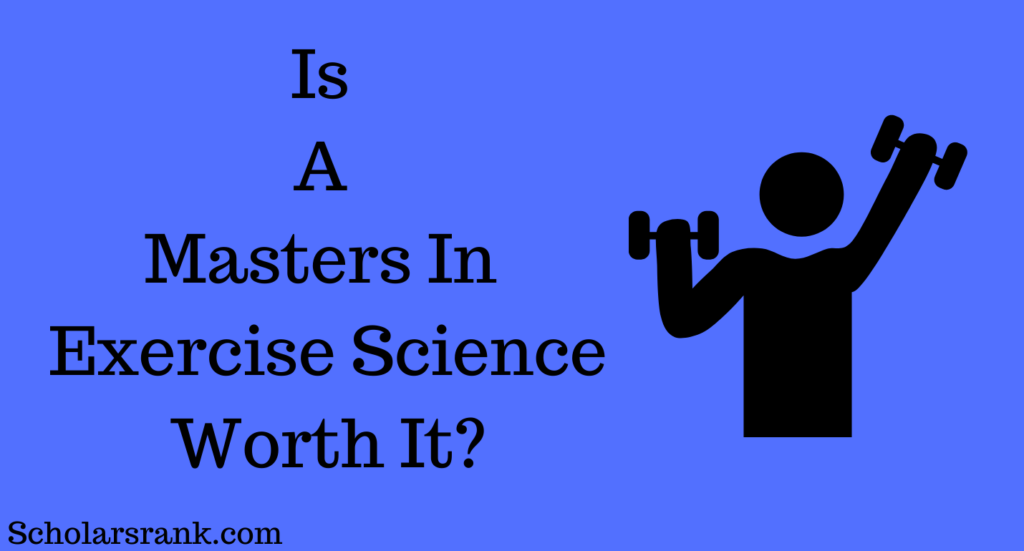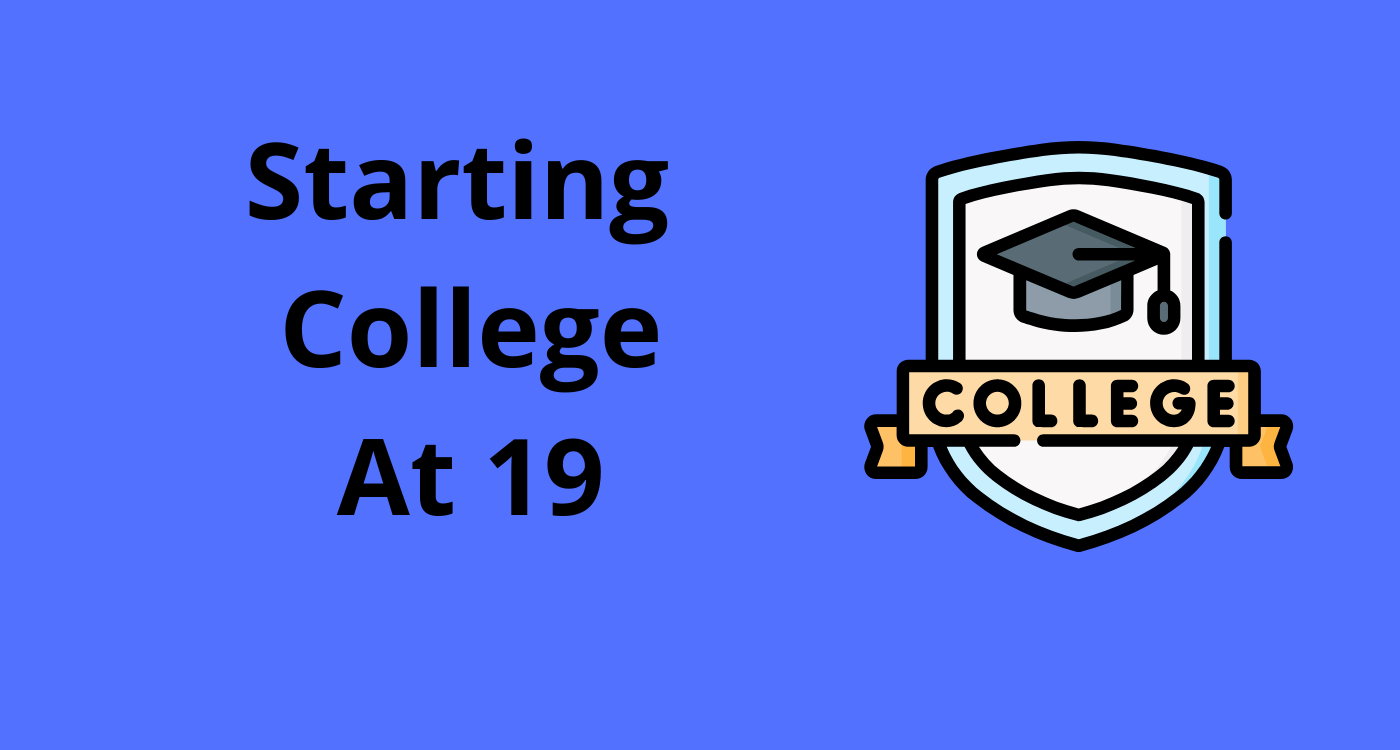Introduction
Is A Masters In Exercise Science Worth It? It is undoubtedly worthwhile your time and money to pursue a career in the fitness business if that is what you intend to do.
You can have significant and long-lasting effects on your life and career by choosing to pursue a master’s in exercise science. You can direct exercise programs at healthcare facilities, weight reduction clinics, health clubs, corporations, and more with a Master’s degree.
Additionally, business for exercise scientists is booming. According to Labor Insights by Burning Glass, these professionals’ employment is expected to increase by 13.2% over the following ten years. According to the U.S. Bureau of Labor Statistics (BLS), the number of exercise science careers in the U.S. will increase from 19,800 in 2019 to 22,100 by 2029 as healthcare providers emphasize exercise and preventive care as a way to aid patients in recovering from illnesses and enhancing their health.
You can find the greatest and most up-to-date information on master’s in exercise science jobs and whether a master’s in exercise science degree is worth it by reading the article below.
What Is Exercise Science?
The study of how the body reacts to physical activity is known as exercise science. It draws from a variety of fields, including sports psychology, behavioral tactics, exercise program design, sports nutrition, and biomechanics.
The study of living mechanisms is the primary goal of the biological branch of physiology, which serves as the scientific basis of exercise research. Research in physiology focuses on how the body functions at the molecular and cellular levels as well as how the environment affects the body.
Kinesiology and athletic training are fields of study that are related. Graduates with degrees in kinesiology and athletic training may work in the same environments as people with degrees in exercise science, but the duties of their employment differ.
Exercise Science vs. Kinesiology
Exercise science and Kinesiology share many concepts. Although these names are frequently used synonymously, each topic addresses various aspects of mobility in the human body.
| Exercise Science | Kinesiology |
| How the human body responds to exercise and adapts to it is a topic of study in exercise science. People who concentrate on this area of study can work as exercise physiologists, strength and conditioning trainers, or wellness directors, among other professions. | The mechanics of movement are the subject of kinesiology studies. Kinesiology serves as a foundation for research in exercise science and involves the study of the physical performance and function of the body. Rehabilitation therapists, occupational therapists, and wellness consultants are some examples of kinesiology careers. |
Exercise Science vs. Kinesiology: Differences in Career Opportunities
| Exercise Science Careers | Kinesiology Careers |
| Since exercise science is a highly specialized field, graduates frequently follow suit. Typical professions one can pursue after earning an education in exercise science are:Wellness coach, Clinical exercise specialist,Exercise physiologist, Personal trainer Athletic coach Additional opportunities could be found in the fields of Sports, Wellness Fitness. | Graduates in kinesiology can find work in a variety of fields, such as Education TherapySports. Examples include Designing modified physical education programs for use in classrooms or the community.Obtaining the post-graduate training required to practice as a physical or occupational therapist.Training as an athlete or personal trainer. A person with a degree in kinesiology has a wide range of job options at their disposal. |
Despite the differences between the two, it’s crucial to remember that a great exercise science school can encompass some of the same job options that a kinesiology curriculum offers. As unusual as it may seem at first, not all courses should put a strong emphasis on exercise. Functional anatomy and biomechanics, which are essential to both kinesiology and exercise science, should be included in a high-quality exercise science program.
Athletic Training Vs. Exercise Science
Athletic training and exercise science are linked yet have different foci and job prospects.
| Athletic Training | Exercise Science |
| Athletic training is a healthcare occupation that is recognized by the American Medical Association (AMA). Alongside doctors and other medical experts, trainers have licensed health professionals. People with expertise in this area of study concentrate on preventing injuries in athletes and athletic teams. | For people of various ages and fitness levels, an expert in exercise science develops wellness and exercise regimens. People who pursue a specialization in this area of study may find employment as recreation coordinators or personal trainers. |
What Is A Masters In Exercise Science?
Designed to equip graduates with the knowledge and abilities to administer nutrition, sports performance, sport psychology, exercise, and health promotion programs for a varied population, the Master in Exercise Science is a multidisciplinary curriculum.
Exercise physiology was integrated into this 36-credit program together with the three well-liked topics of sports nutrition, athletic performance, and inclusive fitness. Additionally, the curriculum provides academic flexibility with a large selection of elective courses. Students in the program have the chance to get ready for nationally recognized professional certifications from the National Strength & Conditioning Association, American College of Sports Medicine, and National Academy of Sports Medicine (NSCA). Additionally, a working research lab offers students a completely immersive setting.
The following tracks are available for students to select from:
- Exercise Physiology and Sports Nutrition: This track focuses on the importance of exercise in maintaining health and preventing disease, fitness evaluation and planning, and physical activity intervention as possibilities for hands-on learning in a range of contexts.
- Strength, Conditioning, and Sports Nutrition: Designed for people who want to advance their understanding of and competence in the field of athlete strength and conditioning. The curriculum places a strong emphasis on the science and practical application of the most recent research in the area. Through the National Strength and Conditioning Association (NSCA) and the National Academy of Sports Medicine (NASM), students have the chance to obtain national certifications.
- Inclusive Fitness: Provides students with a singular opportunity to integrate advanced courses in exercise science, exercise prescription, and applied behavior analysis to create sports and fitness regimens for people of all abilities.
What You Will Learn In An Exercise Science Program
- Physiology
The systems that keep the human body alive and working are examined when one studies the physiology of the human body. You will understand more exactly how the body’s systems and organs work together to maintain its functionality.
- Kinesiology
Students will discover how the muscular and skeletal systems enable the human body to move as it does in kinesiology, which can be referred to as “movement science.” Your kinesiology classes would concentrate on locating bodily irregularities and discovering solutions.
- Nutrition
For the body to function properly, it needs a balanced diet. You will gain a ton of knowledge about nutrition as a student of exercise science:
The basics of nutrition
How to design a diet that protects against common health issues and stick to it
- How eating habits and behavior are related
- The variations in dietary requirements between nations
- How nutritional requirements alter as people age
- Management skills
Even though it isn’t directly related to the human body, managing people is an essential ability for anyone hoping to advance beyond entry-level employment in the health and fitness sector. Depending on the degree you enroll in, the depth of management studies will vary, but the majority of respected programs will at least give a general review of management fundamentals.
- Anatomy
Understanding the human body’s structure and individual parts is necessary if you want a thorough understanding of how it functions. Your exercise science program’s anatomy studies will assist you in achieving that.
There are two subfields of anatomy: macroscopic anatomy and microscopic anatomy. The bigger body components are the focus of macroscopic anatomy, whereas the tissues and cells that make up those larger body parts are the subjects of microscopic anatomy.
Is A Masters In Exercise Science Worth It?
Should you think about graduate school if you have a bachelor’s degree in exercise science or a related field? If so, what can you do with a master’s in exercise science? Is a masters in exercise science worth it?
A graduate degree in exercise science will prepare you for a variety of employment, stable careers, and personal development opportunities. For working professionals and recent bachelor’s degree graduates in the health and fitness industry, such as health and physical education teachers, coaches, chiropractors, personal trainers, business owners, wellness counselors, military personnel, and other health/fitness professionals, a master’s degree in exercise science and health promotion is available.
Exercise Science is the study of how the body responds to stress from exercise, including acute and long-term adaptations including the effects on health-related indices, pathologies, and its abilities to stop or slow the progression of the disease.
You could find the following additional fields of study within the vertical of exercise science at different educational institutions:
- Kinesiology
- Exercise Physiology
- Exercise Nutrition
- Exercise & Health
- Biomechanics
Additionally, expect a major emphasis on anatomy, physiology, chemistry, biology, and frequently, physics in your curriculum.
Career Options For A Masters In Exercise Science
Students can become qualified for roles in movement-related medicine with a master’s in exercise science. The science that informs practice is taught to students. Some master’s programs call for a bachelor’s degree in a relevant subject. If not, applicants might need to enroll in required courses.
Most full-time students finish this degree in two years. Look at the careers that master’s in exercise science degree holders might choose.
- Rehabilitation Counselor
Counselors for rehabilitation assist those with developmental, emotional, and physical difficulties in achieving independence. They frequently find work at facilities for senior citizens and in community rehabilitation programs. Between 2020 and 2030, the BLS predicts a 10% increase in employment for these specialists.
- Physician Assistants
These individuals collaborate with doctors on medical teams. They assess individuals and make a health condition diagnosis. Some physician assistants have a focus on treating athletes. Physicals for student-athletes are frequently performed by medical assistants. According to the BLS, between 2020 and 2030, employment for these specialists will increase by 31%.
- Occupational Therapist
Occupational therapists assist patients in gaining or regaining mobility for daily activities. Eating, getting dressed, and strolling are some of these activities. Nursing homes, hospitals, and schools are common workplaces for occupational therapists. Between 2020 and 2030, the BLS predicts a 17% increase in employment for these specialists.
- Health Coach
To assist avoid and manage chronic diseases, health coaches encourage people to develop healthy behaviors, enhance their well-being, and adopt healthy lifestyles.
By creating safe exercise routines and tracking results, health coaches assist people in improving their health. They also create diet programs, therefore understanding nutrition is crucial for the job. According to a Harvard Health Publishing article, health coaches and talk therapists both work with patients to improve their behaviors. They both discuss health objectives and techniques with clients.
- Personal Trainer
A personal trainer works one-on-one with clients to help them improve their physical capabilities, fitness, and health. They can also offer dietary and nutritional guidance. They might work with amateur athletes or regular folks who need encouragement and support to lose weight safely. To assist clients in achieving their individual goals, personal trainers might work at fitness centers, exclusive clubs, or on their own.
- Sports Scout
By identifying and luring the greatest athletes to join a team, whether, at the college, amateur, or professional level, sports scouts assist that team’s performance. Sports scouts are experts in the sport at hand and frequently take part in it themselves. Additionally, they frequently have a talent for seeing athletic potential in young athletes.
How to Boost Your Career in Exercise Science
Professionals in the field of exercise science might keep learning long after receiving their degrees. It is made possible by tools like online scholarly journals and virtual webinars. People can develop in their occupations by making an effort to learn new things throughout their lives.
Apart from obtaining a professional degree, people can gain more knowledge about this dynamic field by pursuing certifications and continuing education. This section focuses on these possibilities’ advantages.
- Licenses and/or Certifications
Obtaining certificates and licenses could open up more employment alternatives. These distinctions might help show prospective customers and employers that a candidate has advanced career expertise. Each position has a different set of qualifications and licensing requirements. Personal trainers, for instance, are not required by law to obtain a license or certification.
There is an opportunity to earn certification through the American Society of Exercise Physiologists. Professionals who obtain this certification must pass a test. This exam covers kinesiology, exercise metabolism and control, and cardiac rehabilitation. The American College of Sports Medicine offers a similar credential that professionals can pursue.
- Continuous Learning
Exercise science professionals have various options for continuing their education besides obtaining further certifications and licenses. Researchers continue to generate discoveries that have an impact on industry best practices as more studies are conducted annually.
Getting involved with professional groups is one approach to keeping up with changes in the field. The National Athletic Trainers’ Association, the American Physiological Society, and the American Society of Exercise Physiologists are common associations in this field. These groups organize conferences that educate professionals while also disseminating helpful newsletters.
In some cases, returning to school to obtain a graduate degree may be the best course of action for moving up the career ladder. Particularly for positions requiring an advanced degree in exercise science in the healthcare industry, many companies demand it. Other firms might put a ceiling on raising salaries for those without master’s degrees.
Conclusion
Is A Masters In Exercise Science Worth It? If you obtain a master’s degree in exercise science or a closely related field, such as applied physiology and kinesiology, you can work as an exercise physiologist, coach, personal trainer, sports scout, or in another position that aids people in living healthier lives, whether they are elite athletes, trying to get off the couch, or undergoing rehabilitation.
A master’s in exercise science may boost a graduate’s long-term earning potential. Many employees in the field of exercise science need at least a bachelor’s degree. A master’s degree in exercise science pays 11% more than a bachelor’s degree, according to the job and labor database.
Frequently Asked Questions (FAQs)
Is Exercise Science A Good Career?
- Jobs in exercise science are fulfilling for many people. These specialists improve the lives of their clients. Additionally, they might make more money than ordinary Americans. For instance, the median annual salary for exercise physiologists is nearly $8,300 greater than the average salary for all other jobs. Various work patterns are available for professions in exercise science. Fitness trainers, for instance, can work for themselves if they don’t want to put in the normal 9 to 5 hours required for this position. People who prefer not to work evenings and weekends can, however, work a day shift in a hospital or entertainment facility.
What Are The Highest-Paying Jobs In Exercise Science?
- Some of the highest-paid professionals in this industry are exercise physiologists. As of May 2020, their median yearly income is $50,280. You will need further education to become an occupational therapist, but these individuals have even higher median annual salaries: $86,280. With a degree in exercise science, one can work in many different fields. Various incomes are also available in these fields. As of May 2020, the personal care and service sector, for instance, offered a typical annual wage of $28,120. The median yearly salary for those employed in the healthcare industry is $69,870. Jobs requiring a master’s or doctorate typically pay more than those that only call for a bachelor’s degree.
You can also read, “Is A Masters In Divinity Worth It In 2023?“








